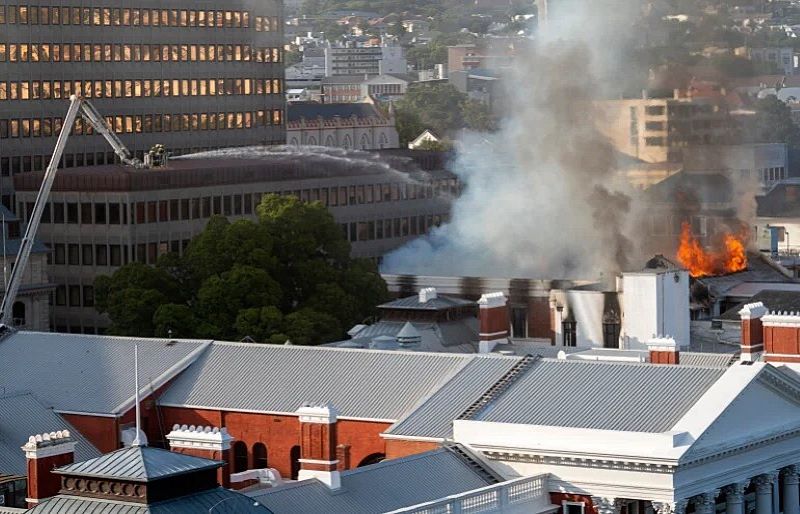A major fire broke out at South Africa’s seat of parliament in Cape Town early Sunday, threatening the National Assembly building.
The fire was believed to have started in one of the older buildings in the parliament precinct, leading to a security cordon nearby the cathedral where anti-apartheid icon Archbishop Desmond Tutu was buried just hours before.
“The roof has caught fire and the National Assembly building is also on fire,” a spokesman for the city’s emergency services told AFP, requesting reinforcements at the scene.
“The fire is not under control and cracks in the walls of the building have been reported,” he added.
No one was believed to have been harmed and the cause of the blaze was not yet known.
Emergency services said that the “fire is currently on the third floor — initial reports indicate it started in the office space and is spreading toward the gymnasium”.
The fire broke out in a former parliament building at around 0300 GMT on Sunday.
Flames and smoke were visible above the building in the early morning, according to AFP journalists at the scene.
Concerned Cape Town residents quickly shared pictures of the fire on Twitter.
Former Cape Town mayor and current minister Patricia de Lille told reporters at the scene that the “actual National assembly is still safe”.
“Fire Service have the situation under control,” she added.
Firefighter reinforcements arrived at the scene, using a crane to spray water on the flames.
Emergency services feared the fire could spread swiftly through the old rooms, which are decorated with thick carpets and curtains.
The area around the fire in the upmarket neighbourhood was quickly cordoned off.
The cordon stretched to where flowers were still displayed in front the nearby St. George’s Cathedral, where Tutu’s funeral took place on Saturday.
After a simple, no-frills mass, with a cheap coffin — according to the famously modest Tutu’s instructions — his ashes were interred in the cathedral.
While Cape Town is home to South Africa’s seat of parliament, including the National Assembly and upper House National Council of Provinces, the government is based in Pretoria.
The Houses of Parliament in Cape Town consist of three sections, including the original and oldest building that was completed in 1884.
The newer additions — constructed in the 1920s and 1980s — house the National Assembly.
Cape Town suffered a previous fire in April, when a blaze on the famed Table Mountain which overlooks the city spread, ravaging part of The University of Cape Town’s library holding a unique collection of African archives.
